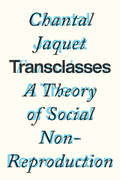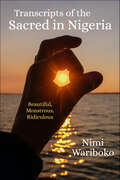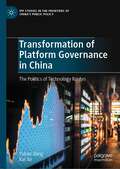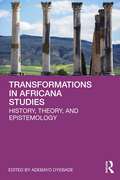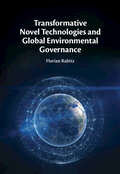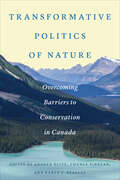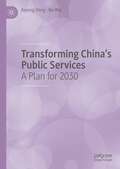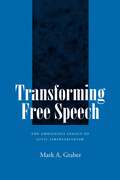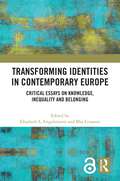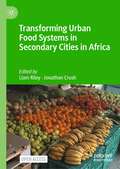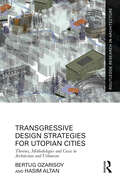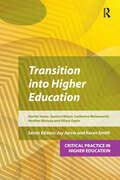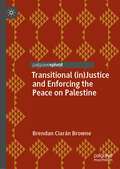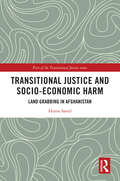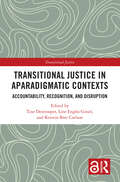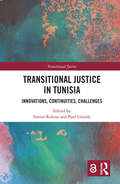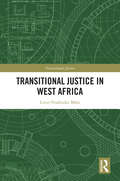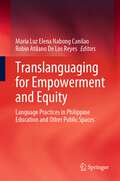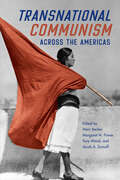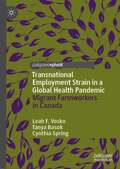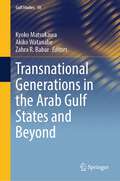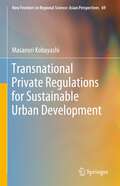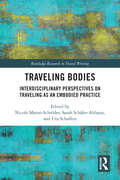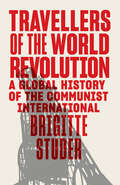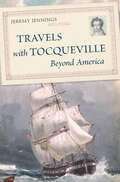- Table View
- List View
Transclasses: A Theory of Social Non-reproduction
by Chantal JaquetHow people become "class traitors"One is not born a worker or a boss. Social reproduction is not an iron law; it admits of exceptions that must be accounted for in order to measure its scope.This book aims to understand the passage from one social class to another and to forge a method of approaching these particular cases which remain a blind spot in the theory of social reproduction. It analyzes the political, economic, social, familial and singular causes that contribute to non-reproduction, and their effects on the constitution of individuals transiting from one class to another.At the crossroads of collective history and intimate history, Chantal Jaquet identifies class locations, the interplay of affects and encounters, and the role of sexual and racial differences. She invites us to break out of disciplinary isolation in order to grasp singularity at the crossroads of philosophy, sociology, psychology and literature.This requires deconstruction of the concepts of social and personal identity, in favour of a concepts like complexion and the criss-crossing determinations. Through the figure of the transclass, it is thus the whole human condition that is illuminated in a new light.
Transcripts of the Sacred in Nigeria: Beautiful, Monstrous, Ridiculous
by Nimi WaribokoTranscripts of the Sacred in Nigeria explores how the sacred plays itself out in contemporary Africa. It offers a creative analysis of the logics and dynamics of the sacred (understood as the constellation of im/possibility available to a given community) in religion, politics, epistemology, economic development, and reactionary violence. Using the tools of philosophy, postcolonial criticism, political theory, African studies, religious studies, and cultural studies, Wariboko reveals the intricate connections between the sacred and the existential conditions that characterize disorder, terror, trauma, despair, and hope in the postcolonial Africa.The sacred, Wariboko argues, is not about religion or divinity but the set of possibilities opened to a people or denied them, the sum total of possibilities conceivable given their level of social, technological, and economic development. These possibilities profoundly speak to the present political moment in sub-Saharan Africa.
Transformation of Platform Governance in China: The Politics of Technology Routes (IPP Studies in the Frontiers of China’s Public Policy)
by Yuhao Jiang Kai JiaThe admiration of science and technology and the emphasis on political stability are two sides of the same coin in China. Therefore, China is more likely to take aggressive measures to promote or inhibit platform development than the United States and the European Union. But the uncertainty in the decision-making process is worrisome and calls for a broader discussion of the multiple political consequences of technology.
Transformations in Africana Studies: History, Theory, and Epistemology
by Adebayo OyebadeThis book introduces readers to the rich discipline of Africana Studies, reflecting on how it has developed over the last fifty years as an intellectual enterprise for knowledge production about Africa and the African diaspora. The African world has always had a wealth of indigenous knowledge systems, but for the greater part of the scholarly history, hegemonic Western epistemologies have denied the authenticity of African indigenous ways of knowing. The post-colonial era has seen steady and deliberate efforts to expand the frontiers of knowledge about black people and their societies, and to Africanize such bodies of knowledge in all fields of human endeavor. This book reflects on how the multidisciplinary discipline of Africana Studies has transformed and reinvented itself as it has sought to advance knowledge about the African world. The contributors consider the foundations of the discipline, its key theories and methods of knowledge production, and how it interacts with popular culture, Women’s Studies, and other area studies such as Ethnic and Afro-Latinix Studies. Bringing together rich insights from across history, religion, literature, art, sociology, and philosophy, this book will be an important read for students and researchers of Africa and Africana Studies.
Transformative Novel Technologies and Global Environmental Governance
by Florian RabitzTransformative Novel Technologies are potential gamechangers for confronting climate change, biodiversity loss, and many other elements of the global environmental crisis, allowing us to achieve a more sustainable future. The contemporary and future international governance of these technologies has crucial implications for managing the global transition towards sustainability. This book is the first to present a comprehensive assessment of the impact of these technologies on international politics. The author examines the responses of international institutions to the emergence of these technologies, focusing on three broad domains: biotechnology, climate engineering, and mineral extraction in areas beyond national jurisdiction (the ocean floor or near-Earth asteroids). This book is aimed at a non-specialist, academic audience with interest in the international and environmental politics of sustainability and technology. This title is part of the Flip it Open Programme and may also be available Open Access. Check our website - Cambridge Core - for details.
Transformative Politics of Nature: Overcoming Barriers to Conservation in Canada
by Andrea Olive Chance Finegan Karen F. BeazleyTransformative Politics of Nature highlights the most significant barriers to conservation in Canada and discusses strategies to confront and overcome them. Featuring contributions from academics as well as practitioners, the volume brings together the perspectives of both Indigenous and non-Indigenous experts on land and wildlife conservation, in a way that honours and respects all peoples and nature. Contributors provide insights that enhance understanding of key barriers, important actors, and strategies for shaping policy at multiple levels of government across Canada. The chapters engage academics, environmental conservation organizations, and Indigenous communities in dialogues and explorations of the politics of wildlife conservation. They address broad and interrelated themes, organized into three parts: barriers to conservation, transformation through reconciliation, and transformation through policy and governance. Taken together, the essays demonstrate the need for increased social-political awareness of biodiversity and conservation in Canada, enhanced wildlife conservation collaborative networks, and increased scholarly attention to the principles, policies, and practices of maintaining and restoring nature for the benefit of all peoples, species, and ecologies. Transformative Politics of Nature presents a vision of profound change in the way humans relate to each other and with the natural world.
Transforming China's Public Services: A Plan for 2030
by Keyong Dong Na WeiThis book explores the developmental direction of the modernization of China's basic public services in the context of national governance modernization. Describing the blueprint for the modernization of China's basic public services in 2030, including basic public education, basic medical and health services, basic old-age services, and basic public cultural services, this book reflects Chinese public management scholars' strategies for the modernization of China’s public services in the next 10 years and the path to get there. This book will interest scholars of Chinese governance, as well as readers who want to understand the current status, challenges and development strategies of China's public service and social policy fields.
Transforming Free Speech: The Ambiguous Legacy of Civil Libertarianism
by Mark A. GraberContemporary civil libertarians claim that their works preserve a worthy American tradition of defending free-speech rights dating back to the framing of the First Amendment. Transforming Free Speech challenges the worthiness, and indeed the very existence of one uninterrupted libertarian tradition.Mark A. Graber asserts that in the past, broader political visions inspired libertarian interpretations of the First Amendment. In reexamining the philosophical and jurisprudential foundations of the defense of expression rights from the Civil War to the present, he exposes the monolithic free-speech tradition as a myth. Instead of one conception of the system of free expression, two emerge: the conservative libertarian tradition that dominated discourse from the Civil War until World War I, and the civil libertarian tradition that dominates later twentieth-century argument.The essence of the current perception of the American free-speech tradition derives from the writings of Zechariah Chafee, Jr. (1885-1957), the progressive jurist most responsible for the modern interpretation of the First Amendment. His interpretation, however, deliberately obscured earlier libertarian arguments linking liberty of speech with liberty of property. Moreover, Chafee stunted the development of a more radical interpretation of expression rights that would give citizens the resources and independence necessary for the effective exercise of free speech. Instead, Chafee maintained that the right to political and social commentary could be protected independent of material inequalities that might restrict access to the marketplace of ideas. His influence enfeebled expression rights in a world where their exercise depends increasingly on economic power.Untangling the libertarian legacy, Graber points out the disjunction in the libertarian tradition to show that free-speech rights, having once been transformed, can be transformed again. Well-conceived and original in perspective, Transforming Free Speech will interest political theorists, students of government, and anyone interested in the origins of the free-speech tradition in the United States.
Transforming Identities in Contemporary Europe: Critical Essays on Knowledge, Inequality and Belonging
by Elisabeth L. EngebretsenInterdisciplinary in perspective, this book explores contemporary struggles around ‘identity politics’ in Europe, offering a unique glimpse into contemporary tensions and paradoxes surrounding identities, belonging, exclusions and their deep-seated gendered, colonial and racist legacies. With a particular focus on the Nordic region, it provides insights into the ways in which people who find themselves in minoritized positions struggle against multiple injustices. Through a series of case studies documenting counter-struggles against racist, colonialist, sexist forms of discrimination and exclusion, Transforming Identities in Contemporary Europe asks how the paradigm and politics of the welfare state operate to discriminate against the most marginalized, by instating a naturalized hierarchy of human-ness. As such it will appeal to scholars across the social sciences and humanities with interests in race, gender, colonialism and postcolonialism, citizenship and belonging.
Transforming Urban Food Systems in Secondary Cities in Africa
by Jonathan Crush Liam RileyCountries across Africa are rapidly transitioning from rural to urban societies. The UN projects that 60% of people living in Africa will be in urban areas by 2050, with the urban population on the continent tripling over the next 50 years. The challenge of building inclusive and sustainable cities in the context of rapid urbanization is arguably the critical development issue of the 21st Century and creating food secure cities is key to promoting health, prosperity, equity, and ecological sustainability. The expansion of Africa’s urban population is taking place largely in secondary cities: these are broadly defined as cities with fewer than half a million people that are not national political or economic centres. The implications of secondary urbanization have recently been described by the Cities Alliance as “a real knowledge gap”, requiring much additional research not least because it poses new intellectual challenges for academic researchers and governance challenges for policy-makers. International researchers coming from multiple points of view including food studies, urban studies, and sustainability studies, are starting to heed the call for further research into the implications for food security of rapidly growing secondary cities in Africa. This book will combine this research and feature comparable case studies, intersecting trends, and shed light on broad concepts including governance, sustainability, health, economic development, and inclusivity. This is an open access book.
Transgressive Design Strategies for Utopian Cities: Theories, Methodologies and Cases in Architecture and Urbanism (Routledge Research in Architecture)
by Bertug Ozarisoy Hasim AltanThis book critically examines the philosophy of the term ‘transgression’ and how it shapes the utopian vision of contemporary urban design scenarios. The aim of this book is to provide scholarly yet accessible graphic novel illustrations to inform narratives of urban manifestos. Through four select case studies from the UK, Cyprus and Germany, the book highlights the paradoxes and contradictions in architecture and provides detailed evaluation of the limits and contemporary forms of sustainable urban regeneration. The book proposes an ‘utopian urban vision’ approach to social, political and cultural relations, trends and tensions – both locally and globally – and seeks to inspire an awakening in architectural discourse. The book argues that the philosophical undermining of transgression is the result of a phenomenon from a different perspective – its philosophical background, social construction, experimental research process and design implications on the city. As such, the book provides a critical examination of how architectural design interventions contribute to sustainable urban regeneration and gentrification and can impact local communities. This book provides a significant contribution to both undergraduate and postgraduate students, as well as early career researchers working in architecture, planning and sustainable urban design. It offers effective guidance on adopting the state-of-the-art graphical illustrations into their own design projects, while considering contradictions between architectural discourse and the philosophy of transgression.
Transition into Higher Education (Critical Practice in Higher Education)
by Harriet Jones Hilary Orpin Gemma Mansi Catherine Molesworth Heather MonseyThis book will help all academic staff in higher education (HE) develop more informed teaching and better support students as they transition to university.It explores the organisations who advise students pre-university and uncovers the myths and misconceptions held by HE stakeholders. Induction and welcome activities are examined in order to identify best practice, transition problems such as study skills, employment, mental health and identity are covered, and a final chapter focuses on the effects of Covid-19 on transition issues.The Critical Practice in Higher Education series provides a scholarly and practical entry point for academics into key areas of higher education practice. Each book in the series explores an individual topic in depth, providing an overview in relation to current thinking and practice, informed by recent research. The series will be of interest to those engaged in the study of higher education, those involved in leading learning and teaching or working in academic development, and individuals seeking to explore particular topics of professional interest. Through critical engagement, this series aims to promote an expanded notion of being an academic – connecting research, teaching, scholarship, community engagement and leadership – while developing confidence and authority.
Transitional (Rethinking Peace and Conflict Studies)
by Brendan Ciarán BrowneThis book considers the growing interest in transitional justice practices that take place against the backdrop of ongoing settler-colonialism in Palestine. By critiquing the role of common top-down and bottom-up interventions, namely truth recovery and international criminal justice, the book argues that transitional justice acts as an extension of a deeply flawed peacebuilding process that has been so destructive in Palestine and has a deflating effect when it comes to advancing calls for meaningful decolonisation. A ‘radicalisation’ of transitional justice that takes place in settler-colonial contexts, one that prioritises conversations around meaningful decolonisation, is therefore required. The book will appeal to those with an interest in peacebuilding, conflict transformation and transitional justice.
Transitional Justice and Socio-Economic Harm: Land Grabbing in Afghanistan
by Huma SaeedMaintaining the importance of socio-economic issues in devising transitional justice mechanisms, this book examines the widespread practice of land grabbing in Afghanistan. On 3 September 2003, 100 armed police officers bulldozed around 30 homes in the Sherpur neighborhood of Kabul, Afghanistan, evicting over 250 people. Historically, the land was part of the property of the Ministry of Defense, of which a zone was allocated to the ministry’s employees who had built homes and had lived there for nearly 30 years. After the demolition, however, the land was distributed among 300 high-ranking government officials, including ministers, deputy ministers, governors and other powerful warlords. Land grabbing in Afghanistan has become a widespread practice across the country. Based on over 50 semi-structured interviews with key informants and group discussions with war victims and local experts in Kabul, the current book examines the relevance of transitional justice discourse and practice in response to this situation. Following a critical criminological concern with social harm, the book maintains that it is not enough to consider a country’s political history of violent conflict and the violation of civil and political rights alone. Rather, to decide on appropriate transitional justice mechanisms, it is crucial to consider a country’s socio-economic background, and above all the socio-economic harm inflicted on people during periods of violent conflict. This original and detailed account of the socio-economic challenges faced by transitional justice mechanisms will be of interest to those studying and working in this area in law, politics, development studies and criminology.
Transitional Justice in Aparadigmatic Contexts: Accountability, Recognition, and Disruption
by Tine Destrooper, Line Engbo Gissel, and Kerstin Bree CarlsonThis book explores the practical and theoretical opportunities as well as the challenges raised by the expansion of transitional justice into new and ‘aparadigmatic’ cases. The book defines transitional justice as the pursuit of accountability, recognition and/or disruption and applies an actor-centric analysis focusing on justice actors’ intentions of and responses to transitional justice. It offers a typology of different transitional justice contexts ranging from societies experiencing ongoing conflict to consolidated democracies, and includes chapters from all types of aparadigmatic contexts. This covers transitional justice in states with contested political authority, shared political authority, and consolidated political authority. The transitional justice initiatives explored by the wide range of contributors are those of Afghanistan, Belgium, France, Greenland/Denmark, Libya, Syria, Turkey/Kurdistan, UK/Iraq, US, and Yemen. Through these aparadigmatic case studies, the book develops a new framework that, appropriate to its expanding reach, allows us to understand the practice of transitional justice in a more context-sensitive, bottom-up, and actor-oriented way, which leaves room for the complexity and messiness of interventions on the ground. The book will appeal to scholars and practitioners in the broad field of transitional justice, as represented in law, criminology, politics, conflict studies and human rights.
Transitional Justice in Tunisia: Innovations, Continuities, Challenges
by Paul Gready Simon RobinsThis book engages comprehensively with the dynamics of the transitional justice process in Tunisia and its mechanisms, elaborating lessons for transitional justice practice globally. Grounded in new empirical material as well as a broader awareness of transitional justice, this book provides a thorough assessment of transitional justice in Tunisia. Beyond an overview of the process, it critically engages with key questions such as the extent to which the process articulated global contemporary practice, such as liberal state-building and narrow conceptions of justice as civil-political rights, and to which it generated novel approaches at odds with the mainstream that can inform global practice. The book examines how the transitional justice process in Tunisia has been contextualised and made relevant to the nation’s circumstances and needs. It looks at innovation at the level of formal mechanisms and at the dynamics of mobilisation and contestation surrounding transitional justice both from civil society organisations and victims’ groups. Bringing together analysis from legal scholars, social scientists as well as activists and practitioners, the book challenges the legalism of transitional justice discourse globally, engendering a dialogue between these legal and judicial approaches on the one hand and alternative, more diverse and radical approaches to justice on the other, in order to both deal with the past and to address ongoing injustice. This first book in English to address the dynamics and mechanisms of the transitional justice process in Tunisia will appeal to students and scholars of transitional justice, human rights, peacebuilding, conflict and peace studies, development, and security studies, as well as policymakers and practitioners in these fields, and others with interests in Middle Eastern studies.
Transitional Justice in West Africa
by Linus Nnabuike MaluThis book explores the challenges of transitional justice in West Africa, specifically how countries in the region have dealt with transitional justice problems in the last 30 years (1990–2020), and how they have managed the process. Using comparative, historical, and legal analyses it examines the politics of justice after violent conflicts in West Africa, the major transitional justice mechanisms established in the region, and how countries have used these institutions to address injustice and the pains of war in some West African countries. The book examines how transitional justice mechanisms have contributed to victims’ rights, reconciliation, and peace in transitional societies, and whether transitional justice mechanisms deployed in West Africa were suitable or ill-fitted, and the politics of deploying them. The book is addressed to a wide audience: policymakers, and graduate and post-graduate students of transitional justice, conflict resolution, peace studies, conflict transformation, international criminal law, law and similar subjects. This book will be of great value to academics and researchers, as well as lecturers in tertiary institutions offering relevant courses; legal practitioners; peace practitioners/NGOs; and those working in the field of transitional justice and human rights.
Translanguaging for Empowerment and Equity: Language Practices in Philippine Education and Other Public Spaces
by Maria Luz Elena Nabong Canilao Robin Atilano De Los ReyesThis book investigates how translanguaging is employed for pedagogical purposes and describes how speakers use translanguaging in specific multilingual contexts. It examines the beliefs and perceptions that shape translanguaging in different public spaces and interrogates the notion of translanguaging through the lens of various Philippine public spaces. This book also focuses on the breakthroughs that may be achieved through translanguaging in the academic field and other domains. It presents studies conducted in the Philippines, a multilingual and post-colonial setting where many multilingual speakers engage in translanguaging practices while recognizing the significance of each language in their communication repertoire in expressing their ideas and identities. It provides insights and knowledge on the current language practices in basic and tertiary education and offers more information about the crucial role of translanguaging in the government, media, and church domains in the Philippines. While this book mainly covers the use of translanguaging in various domains in the Philippines, it remains relevant to other multilingual societies around the world. Being a highly multilingual society, the Philippines serves as a global case study for understanding multilingualism. This book demonstrates how blocks to translanguaging may be overcome and explores possibilities that may be considered in introducing it as an effective pedagogical and communication tool. It emphasizes the importance of recognizing the translingual paradigm as a strong force that has been adopted by multilingual language users to promote empowerment and equity.
Transnational Communism across the Americas
by Tanya Harmer Marc Becker Tony Wood Margaret Power Jacob Blanc Jacob A. Zumoff Victor Jeifets Adriana Petra Patricia Harms Lazar Jeifets Frances Peace Sullivan Kevin A YoungTransnational Communism across the Americas offers an innovative approach to the study of Latin American communism. It convincingly illustrates that communist parties were both deeply rooted in their own local realities and maintained significant relationships with other communists across the region and around the world. The essays in this collection use a transnational lens to examine the relationships of the region’s communist parties with each other, their international counterparts, and non-communist groups dedicated to anti-imperialism, women’s rights, and other causes. Topics include the shifting relationship between Mexican communists and the Comintern, Black migrant workers in the Caribbean, race relations in Cuba, Latin American communists in the USSR, Luís Carlos Prestes in Brazil, the U.S. and Puerto Rican communist and Nationalist parties, peace activist networks in Latin America, communist women in Guatemala, transnational student groups, and guerrillas in El Salvador. Contributors: Marc Becker, Jacob Blanc, Tanya Harmer, Patricia Harms, Lazar Jeifets, Victor Jeifets, Adriana Petra, Margaret M. Power, Frances Peace Sullivan, Tony Wood, Kevin A. Young, and Jacob Zumoff
Transnational Employment Strain in a Global Health Pandemic: Migrant Farmworkers in Canada (Politics of Citizenship and Migration)
by Tanya Basok Leah F. Vosko Cynthia SpringThe 2020-22 COVID-19 pandemic reinforced inequalities between the global North and South, amplifying pre-existing disparities between migrant and citizen/permanent resident workers in receiving and sending states worldwide. In contexts such as Canada, it also underscored that many workers in occupations and sectors deemed “essential” enough to be exempt from stay-at-home orders and other public safety measures are migrants, a sizeable number of whom sustain Canada’s food supply through their work in its agricultural industry.This book explores the dynamics behind the pandemic’s deleterious outcomes for this vital group of workers, highlighting migrant farmworkers importance to the Canadian economy, society, and the world of work alongside the conditions they endured before and during the global health pandemic through policy and media analysis and open-ended interviews with workers enrolled in two streams of Canada’s Temporary Foreign Worker Program (TFWP) as well as migrants without legal status employed in agriculture located in Ontario and Quebec. Advancing the notion of transnational employment strain, the authors derive insight from the employment strain model, a framework for understanding risks to the physical and psychological well-being of workers, and expand it to account for migrants’ relationships across transnational space.
Transnational Generations in the Arab Gulf States and Beyond (Gulf Studies #10)
by Zahra R. Babar Kyoko Matsukawa Akiko WatanabeThis book examines the recent migration phenomenon in the Arab Gulf states for work and residence. It sheds light on the transnationality of diverse groups of migrants from different generations, and unpacks how migrants’ multiple senses of belonging, orientations and adaptive strategies have shaped contemporary migration in the Gulf region. In turn, the analysis presented here shows how the Arab Gulf states’ citizenship and educational policies affect second-generation migrants in particular. Through a series of fine-grained ethnographic case studies, the authors demonstrate the ways in which these second-generation migrants construct their identities in relation to their putative ‘home’ country in the Gulf as well as their complex relationship to their parents’ countries of origin. This is what underpins the deeply transnational character of their lives, choices and notions of belonging. While migration scholars often situate these groups as ‘temporary’, this does not in fact capture the reality of temporariness for the migrants themselves, their children or their dependants. The result is a complex and ongoing construction of identity that shapes the way of life for millions of migrants. Relevant to scholars of migration and international studies, particularly focused on the Middle East, Transnational Generations in the Arab Gulf States and Beyond is also of interest to social scientists researching student mobility in higher education, intergenerational families, identity politics and globalisation.
Transnational Private Regulations for Sustainable Urban Development (New Frontiers in Regional Science: Asian Perspectives #69)
by Masanori KobayashiThis book analyzes the mechanism of transnational private regulations (TPRs) in the global property investment market and the conditions of their effectiveness for sustainable urban development. In the present economy, with control over national legislation alone, state policymakers have been challenged to regulate transnational investors, markets, and issues such as global warming, financial crises, food safety risks, deforestation, and cross-border business transactions. Transgovernmental networks of regulators have assembled representatives and technical experts from national regulatory agencies, nongovernmental organizations, private firms, and business organizations. As private corporations become increasingly globalized, many forms of TPRs have emerged since the 1990s for legislation, standard-setting, monitoring of compliance, and implementation of transnational rules, to respond to challenges posed by the transformation of domestic and international regulatory environments. TPRs are self-regulated, non-state, market-driven regulations. Since the emergence of TPRs, the global rule-making landscape has become dynamic. Urban development and property investment have been viewed historically as local phenomena: The regulations and standards in this field have been established and enforced by governments, local associations, and national professional bodies. However, as urban development and property investment increasingly have been globalized, the services, transactions, and investments by private firms have transcended national boundaries. For this reason, it has become difficult for states to regulate global activities through existing national legislation or international regulatory systems. As the management of new transnational issues through collaborations between various actors is unpredictable, it is necessary to examine the mechanism of TPRs in global property investment and their effectiveness for sustainable urban development.
Traveling Bodies: Interdisciplinary Perspectives on Traveling as an Embodied Practice (Routledge Research in Travel Writing)
by Nicole Maruo-Schröder, Sarah Schäfer-Althaus, and Uta SchaffersTraveling Bodies: Interdisciplinary Perspectives on Traveling as an Embodied Practice explores the central role the body has in and for traveling and thus complements and expands upon existing research in travel studies with new perspectives on and insights in the entanglement of bodies and traveling. The case studies assembled in this volume discuss a variety of traveling practices, experiences, and media with chapters featuring Asian, American, and European historical and contemporary perspectives. Truly interdisciplinary in its approach, the volume identifies and examines diverse literary, historical and cultural texts, contexts, and modes in which traveling and the body intersect, including ‘classic’ travelogues, (new) media (e.g., film, digital travel apps), surf culture, and travel-inspired tattoos. The contributions offer various avenues for further research, not only for scholars working with body theory and travel (writing), but also for anyone interested in the intersections of literature, culture, media, and embodied practices of traveling.
Travellers of the World Revolution: A Global History of the Communist International
by Brigitte StuderHope, Struggle and Defeat: The Communist International and the Global Fight for Freedom The Communist International was the first organised attempt to bring about worldwide revolution and left a lasting mark on 20th-century history. The book offers a new and fascinating account of this transnational organisation founded in 1919 by Lenin and Trotsky and dissolved by Stalin in 1943, telling the story through the eyes of the activists who became its &“professional revolutionaries.&” Studer follows such figures as Willi Münzenberg, Mikhail Borodin, M.N. Roy and Evelyn Trent, Tina Modotti, Agnes Smedley and many others less well-known as they are despatched to the successive political hotspots of the 1920s and &’30s, from revolutionary Berlin to Baku, from Shanghai to Spain, from Nazi Germany to Stalin&’s Moscow. It traces their journeys from revolutionary hope to accommodation, defeat or death, looking at questions of motivation and commitment, agency and negotiation, of life and love, conflict and frustration. In doing so, it reveals a forgotten Comintern, the expression of a multi-dimensional revolutionary moment, which attracted not only working-class but feminist, anti-racist, anti-colonial and anti-imperialist activists, highlighting the role of women in the Comintern and the centrality of anti-colonialism to the Communist project. The book concludes with a reflection on the ultimate demise of a historically unique undertaking.
Travels with Tocqueville Beyond America
by Jeremy JenningsA revelatory intellectual biography of Tocqueville, told through his wide-ranging travels—most of them, aside from his journey to America, barely known.It might be the most famous journey in the history of political thought: in 1831, Alexis de Tocqueville sailed from France to the United States, spent nine months touring and observing the political culture of the fledgling republic, and produced the classic Democracy in America.But the United States was just one of the many places documented by the inveterate traveler. Jeremy Jennings follows Tocqueville’s voyages—by sailing ship, stagecoach, horseback, train, and foot—across Europe, North Africa, and of course North America. Along the way, Jennings reveals underappreciated aspects of Tocqueville’s character and sheds new light on the depth and range of his political and cultural commentary.Despite recurrent ill health and ever-growing political responsibilities, Tocqueville never stopped moving or learning. He wanted to understand what made political communities tick, what elite and popular mores they rested on, and how they were adjusting to rapid social and economic change—the rise of democracy and the Industrial Revolution, to be sure, but also the expansion of empire and the emergence of socialism. He lauded the orderly, Catholic-dominated society of Quebec; presciently diagnosed the boisterous but dangerously chauvinistic politics of Germany; considered England the freest and most unequal place on Earth; deplored the poverty he saw in Ireland; and championed French colonial settlement in Algeria.Drawing on correspondence, published writings, speeches, and the recollections of contemporaries, Travels with Tocqueville Beyond America is a panoramic combination of biography, history, and political theory that fully reflects the complex, restless mind at its center.
